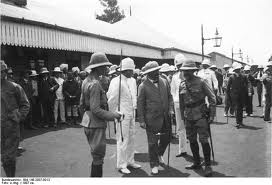By Hannes Wessels
I write as a concerned father whose daughter, like millions of other children, has recently been taught about colonialism which is subtly lumped together with slavery to create the strong but false impression the two were pretty much synonymous . The tuition followed the familiar line about this period being motivated by greedy white capitalists intent on plundering the poor peace-loving natives while visiting an alien authority upon a tropical paradise causing enormous pain and suffering. As someone who once lived in a colony and therefore a ‘suspect’ I tried to explain my defense based on my empirical experience but I’m not sure if I succeeded.
One of newly elected US President Barak Obama’s first actions on moving into the White House was to be rid of a bust of Winston Churchill in the Oval Office. It offended him, we are told, because it reminded him of Britain’s brutal occupation of Kenya. Virtually every post WW II political and religious leader of any consequence out of the ‘West’ has at some stage expressed regret for European imperial rule and condemned the perpetrators. Popes John Paul II and Benedict famouly lamented the colonial occupation and Pope Francis is of similar mind. A succession of Archbishops of Canterbury have expressed regret over Britain’s imperial past. This understanding has been strongly reinforced by the mainstream media and the entertainment industry making this view virtually incontrovertible.
For over 50 years leaders of independent former African colonies have made fortunes out of plucking the heart-strings of guilt stricken Europeans falling over themselves to compensate their former ‘victims’ and be forgiven the diabolical excesses of their unfortunate past.This has amounted to hundreds of billions of dollars aimed at education, medication and general poverty alleviation poured into countries that were once reasonably prosperous. To little avail but the tap remains open. Western money pours in and poor people pour out. Those who dare to question the received wisdom that colonialism was a crime and the guilty must pay, risk inevitably being condemned as ‘racists’. This catch-all condemnation conveniently carries with it all the attendant censures and punishments so most prefer to toe the line.

But recent and current events are posing some tough questions. For a riveting example of the “Law of Unintended Consequences”, kicking in look no further than the recent French military intervention in Mali which was aimed at expelling Islamic militants (with presumed Al Qaeda links) from the country. The man that ordered the troops in; France’s ‘lefty’ President Francois Hollande is no Napoleon and coming from a solid socialist background he’s certainly no imperialist so he and millions of like-minded Europeans must have been a little bewildered by the local euphoria that greeted the arrival of the French Marines and Legionnaires in the country. Far from following the conventional wisdom and bemoaning the arrival of the beastly ‘Frogs’ the Malian were thrilled and quel horreur alors, they are being emphatically asked not to go home.
In just the first four months of this year, ‘Frontex’, the EU Border Agency monitor, estimates at least 60,000, mainly sub-Saharan migrants, risked their lives to make the ocean crossing to Europe using the Italian island of Lampedusa as the foothold to entry. In one week in June over 5,000 Africans were plucked from perishing in the sea by Italian naval vessels. The Spanish frontier is also under siege from African refugees and the security services are fighting regular running battles to keep desperate asylum-seekers out of the exclaves of Ceuta and Melilla on the Moroccan border.
The effects of the post-colonial African exodus morphed into a political earthquake in the recent European Parliamentary elections. Anti-immigrant parties, most notably in France and the United Kingdom, tapped into widespread popular anger among European ‘natives’ and blasted the governing incumbents out of their multi-cultural comfort zone.
In the introduction to his book ‘The Trouble With Africa’ Robert Calderisi recounts the sad story of two boys from Conakry in Guinea who stowed away in the cargo-hold of a Brussels-bound airliner. They perished on the journey of asphyxiation and cold but in the hand of the one was a crumpled hand-written note lamenting their misery adding an appeal to Europe; “Therefore we African children … are asking you to set up an efficient organisation to help with the development of Africa…. if we are sacrificing ourselves and putting our lives in jeopardy it is because we need your help.”
In a sense Africa is simply reverting to type. Prior to the colonial era most lived in rural fiefdoms commanded by Chiefs who ruled on a whim with absolute and savage power. There were no courts to speak of, no elections, few property rights and little protection of the person. Whoever ruled, ruled absolutely and unconditionally and in most cases with brutality. Freedom was a foreign concept.
This process was in some cases halted and in others merely constrained by the European colonials but variable degrees of order were introduced. This has dissipated. The fact is, it is now crystal clear, the majority of Africans want to live under European rule and they are quite prepared to die for that privilege. They don’t want to live under the Chinese who they are now getting to know and loathe and they fear the Arabs and the harshness of Islamic rule.
All that most of them have witnessed in their homelands is the pillage and plunder that has become synonymous with African regimes and they know there is little or no possibility of any meaningful change that will provide them with an opportunity to improve their lives. They have concluded, quite simply, if European rule won’t come to them then they will go to European rule! And if European rulers don’t want to go to them then they should take another look at Ceuta and Melilla and therein may lie a solution.
Prospect, the left-of-centre British monthly ventured out of comfortably politically-correct cover with an intriguing article by Paul Romer on ‘Charter Cities’. He makes a strong case for the construction of urban conurbations under a charter granted to a foreign entity. Using Hong Kong as an example he argues strongly in favour of creating the conditions needed for economic prosperity by introducing experts who know how to do this. He correctly argues that hundreds of billions in foreign aid has already been squandered and argues future financial flows to Africa should be channelled into schemes such as those envisaged by him which will provide engines for economic growth.
The answer to Africa’s gloom is therefore obvious: Reinstate the rule of law through intervention leading to effective governance. We now know African leaders, no matter how much financial assistance is provided, are seldom capable of this endeavour so it has to come from outside and no prizes for recognising the ‘usual suspects’ to provide this service. Successfully done this will provide a platform for economic growth in Africa which will provide a destination for skilled Europeans marooned at home by moribund economies and work for thousands of poor Africans. These Africans will then have reason to stay at home rather than run and who knows, Brazzaville may become more appealing than Brixton, Malabo better than Milan and Bangui more comfortable than the Banlieus of Paris.
In ‘The Selfish Gene’ Richard Dawkins wrote; “But unfortunately however much we may deplore something it does not stop it being true.” With this plan everybody wins but what the hell do you call this other than colonialism!
Discover more from Africa Unauthorised
Subscribe to get the latest posts sent to your email.


